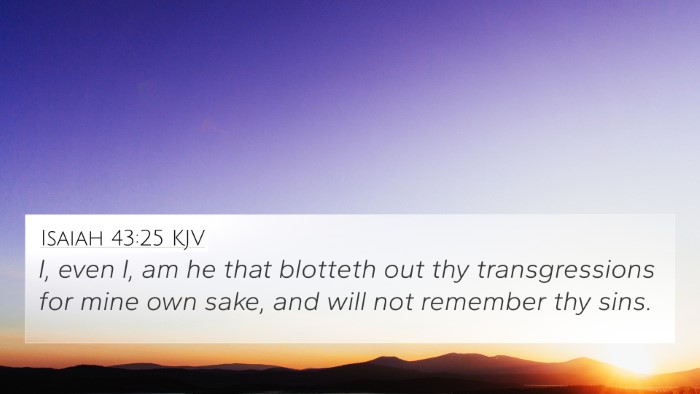Understanding Nehemiah 4:5
The verse Nehemiah 4:5 says:
"And cover not their iniquity, and let not their sin be blotted out from before thee: for they have provoked thee to anger before the builders."
This passage reflects Nehemiah's plea regarding the adversaries of Jerusalem, showing a deep concern for the integrity of the rebuilding efforts and the spiritual factors at play. Below, we explore detailed interpretations from renowned public domain commentaries such as those by Matthew Henry, Albert Barnes, and Adam Clarke.
Commentary Insights
Matthew Henry: Henry notes that Nehemiah's prayer depicts the urgency of the situation facing Jerusalem’s builders. By asking God not to forgive the enemies' sins, Nehemiah highlights their hostility and defiance against God's work. This invokes a sense of divine justice and a call for accountability, creating a serious tone concerning the opposition faced.
Albert Barnes: Barnes emphasizes the depth of Nehemiah's anguish. He interprets the phrase "cover not their iniquity" as a beseeching acknowledgment of the enemies’ corrupt intentions. This divine request serves not merely as an appeal for judgment, but as an expression of how their actions contradict the purpose and will of God toward His people. Barnes encourages understanding this verse in the context of communal integrity and fidelity to God.
Adam Clarke: Clarke provides a broader theological perspective, suggesting that Nehemiah's call for divine judgment operates within the framework of accountability before God. He points to the seriousness of provoking God's wrath through opposition to His plans. Clarke also reflects on the cultural significance of community in ancient Israel, where such prayers could have profound implications for communal identity and divine favor or abandonment.
Thematic Connections
Nehemiah 4:5 is rich in thematic connections that reveal the dynamic interplay between human struggle and divine oversight. Below are connections and parallels found throughout Scripture.
- Psalm 69:28: A similar prayer for the enemies' sins not to be written in the book of life.
- Isaiah 65:6-7: A declaration of God's judgment upon those who oppose His people.
- Lamentations 3:64-66: The appeal for God to take vengeance on adversaries for their wrongdoing.
- Jeremiah 18:23: Speaking against the righteous—a parallel theme of divine justice being sought.
- Micah 7:18-19: Reflecting upon God's forgiveness yet recognizing the need for judgment against wickedness.
- Revelation 6:10: The souls under the altar asking for justice against those who dwell on the earth.
- Luke 18:7-8: Jesus speaks of God avenging His elect, providing context for divine involvement.
Cross-Referencing Biblical Texts
When studying Nehemiah 4:5, we can utilize various tools for Bible cross-referencing to deepen our understanding:
- Bible Concordance: Use this to find related scriptural references and themes.
- Bible Cross-Reference Guide: Helpful in identifying verses that support Nehemiah's predicament.
- Cross-Reference Bible Study: An effective method for comparing thematic elements across the Scriptures.
- Bible Reference Resources: Augments study with insights into connections between verses.
- Comprehensive Bible Cross-Reference Materials: Tools that assist in linking different parts of the biblical text for cohesive understanding.
Identifying Connections
Understanding how Nehemiah 4:5 links with other Biblical verses enhances our overall grasp of scriptural messages. Here are some methods for identifying such connections:
- How to find cross-references in the Bible: Look for keywords, themes, and moral lessons that resonate in different contexts.
- Identifying connections between Old and New Testament: Comparing similar motifs such as divine judgment, mercy, and communal identity.
- Cross-referenced themes in the Bible: Analyzing actions taken by God in response to opposition across both testaments.
- Comparative study of Pauline epistles: Synthesizing New Testament insights that relate back to Old Testament events.
- Interpreting Biblical themes through cross-references: Using cross-references for deeper theological reflections on God's justice and mercy.
Conclusion
Nehemiah 4:5 serves not only as a reaction to present challenges but also as a lasting reminder of the relationship between God's will and human actions. Through careful cross-referencing and a thematic analysis of scripture, we uncover the multidimensional aspects of faith, accountability, and the divine response to human conflicts.
In conclusion, the study of this verse alongside its related scriptural connections enhances our understanding of the themes of justice, community integrity, and divine providence. By exploring these connections and insights, readers are better equipped to engage with scripture meaningfully, reflect on their own circumstances, and appreciate the timelessness of God’s word.












